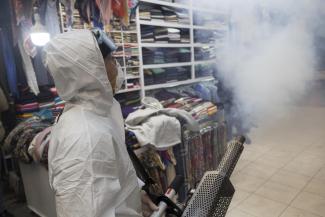Corona virus
Suddenly overwhelmed health sector

Iran's health system was caught off guard. Reasons probably included the upcoming parliament elections and festivities for the Islamic Revolution’s anniversary. For a while, the government covered up the fact that Covid-19 had already entered the country.
On February 19th, Iran officially announced that two people were infected. Only a few hours later, both were said to have died. That would have added up to a mortality rate of 100 % and was a clear sign of many cases being either undiagnosed or hushed up. The outbreak was obviously out of control already.
Trust levels are low in Iran. Many people do not believe the statements of the autocratic regime. Accordingly, many do not follow the recommendations of health authorities either. Adding to the problems, the lack of reliable fact-based information creates a fertile breeding ground for conspiracy theories.
One rumour was that “drinking alcohol prevents Covid-19”. When this comment was written in mid-March, more than three dozen persons had died because they had consumed methanol, a toxic alcohol variety. It turned out that manipulated methanol was being sold on black markets, with demand being driven by Covid-19 fears.
At the same time, Covid-19 had killed more than 300 people and infected some 9000, as the London-based The Economist reported. A considerable number of government leaders and members of parliament are known to be infected. Their seemingly high infection rate is probably the consequence of a testing bias. Privileged persons have access to the diagnostic kits which are otherwise in short supply. Ordinary Iranians are only tested if they show severe signs of Covid-19. Patients with milder symptoms are likely to walk around, unwittingly infecting others. The situation is certainly worse than the official statistics indicate.
The new virus has reached both poor and rich. However, not only test kits are scarce, medical goods in general are hard to get. Treatment is therefore expensive – and often unaffordable to people who lack money.
Nonetheless, Iran's doctors and nurses are exhausted. Posts on social media platforms show overcrowded hospitals with patients resting on beds in hallways. They also show health workers on duty without the proper protective gloves and sanitary masks. According to official data, Covid-19 killed about 20 health-care professionals in less than 20 days after the first cases. The situation in the hospitals is set to get worse for some time.
International aid, moreover, has been slowed down by the US sanctions. In strictly legal terms, the sanctions permit humanitarian products to be sold to Iran, but banks shy away from the risk of trading with the Islamic republic. Moreover, rich nations are increasingly blocking the export of goods that are relevant to their own Covid-19 response.
Whether in rural or urban areas, economically disadvantaged people tend to share small homes with large families which often include grandparents and even great grandparents. Moreover, their communities tend to be densely populated. For Iran's poor, self-quarantine and social distancing are hardly an option.
It is too early to tell what toll the disease will take in Iran. On the upside, Iran's population is quite young so the mortality rate is expected to stay comparatively low. Covid-19 affects the elderly worst. However, the economy is fragile, and so is society in general.
Iran is not a least-developed country. The health sector is actually considered to be quite strong, but it is constrained by economic sanctions and hampered by a general lack of trust. In this setting, Covid-19 looks overwhelming. It is scary to consider what may lie ahead. Nonetheless, the disease is likely to prove even more devastating in least-developed countries. That is especially true if a history of authoritarian rule following colonial despotism has undermined their people's faith in authorities.
Shora Azarnoush works for Deutsch Welle’s Farsi programme. shora.azarnoush@dw.com











